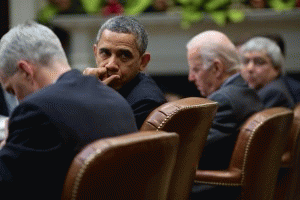Reprinted from Consortium News

President Barack Obama, with Vice President Joe Biden, attends a meeting in the Roosevelt Room of the White House, Dec. 12, 2013.
(Image by (Official White House Photo by Pete Souza)) Details DMCA
There is an obvious course that President Barack Obama could follow if he wants to lessen the crises stemming from the Syrian war and other U.S. "regime change" strategies of the past several decades, but it would require him to admit that recent interventions (including his own) have represented a strategic disaster.
Obama also would have to alter some longstanding alliances -- including those with Turkey, Saudi Arabia and Israel -- and correct some of the false narratives that have been established during his administration, such as storylines accusing the Syrian government of using sarin gas on Aug. 21, 2013, and blaming the Russians for everything that's gone wrong in Ukraine.
"Stratcom" also serves to manage the perceptions of the American people, an assault on the fundamental democratic precept of an informed electorate. Instead of honestly informing the citizenry, the government systematically manipulates us. Obama would have to learn to trust the people with the truth.
Whether Obama recognizes how imperative it is that he make these course corrections, whether he has the political courage to take on entrenched foreign-policy lobbies (especially after the bruising battle over the Iran nuclear agreement), and whether he can overcome his own elitism toward the public are the big questions -- and there are plenty of reasons to doubt that Obama will do what's necessary. But his failure to act decisively could have devastating consequences for the United States and the world.
In a way, this late-in-his-presidency course correction should be obvious (or at least it would be if there weren't so many layers of "strategic communications" to peel away). It would include embracing Russia's willingness to help stabilize the political-military situation in Syria, rather than the Obama administration fuming about it and trying to obstruct it.
For instance, Obama could join with Russia in stabilizing Syria by making it clear to putative U.S. "allies" in the Mideast that they will face American wrath if they don't do all that's possible to cut off the terrorists of the Islamic State and Al Qaeda from money, weapons and recruits. That would mean facing down Turkey over its covert support for the Sunni extremists as well as confronting Saudi Arabia, Qatar and other Persian Gulf sheikdoms over secret funding and arming of these jihadists.
If Obama made it clear that the United States would take stern action -- such as inflicting severe financial punishments -- against any country caught helping these terrorist groups, he could begin shutting down the jihadists' support pipelines. He could also coordinate with the Russians and Iranians in cracking down on the Islamic State and Al Qaeda strongholds inside Syria.
On the political front, Obama could inform Syria's Sunni "moderates" who have been living off American largesse that they must sit down with President Bashar al-Assad's representatives and work out a power-sharing arrangement and make plans for democratic elections after a reasonable level of stability has been restored. Obama would have to ditch his mantra: "Assad must go!"
Given the severity of the crisis -- as the refugee chaos now spreads into Europe -- Obama doesn't have the luxury anymore of pandering to the neocons and liberal interventionists. Instead of talking tough, he needs to act realistically.
Putin's Clarity
In a sense, Russian President Vladimir Putin has clarified the situation for President Obama. With Russia stepping up its military support for Assad's regime with the goal of defeating the Islamic State's head-choppers and Al Qaeda's terrorism plotters, Obama's options have narrowed. He can either cooperate with the Russians in a joint campaign against the terrorists or he can risk World War III by taking direct action against Russian forces in pursuit of "regime change" in Damascus.
Though some of Official Washington's neocons and liberal war hawks are eager for the latter -- insisting that Putin must be taught a lesson about Russia's subservience to American power -- Obama's sense of caution would be inclined toward the former.
The underlying problem, however, is that Official Washington's foreign policy "elite" has lost any sense of reality. Almost across the board, these "important people" lined up behind President George W. Bush's invasion and occupation of Iraq, arguably the worst blunder in the history of U.S. foreign policy.
But virtually no one was held accountable. Indeed, the neocons and their liberal interventionist sidekicks strengthened their grip on the major think tanks, the op-ed pages and the political parties. Instead of dialing back on the "regime change" model, they dialed up more "regime change" schemes.
Although historically the U.S. government -- like many other imperial powers -- has engaged in coups and other meddling to oust troublesome foreign leaders, the current chapter on "regime change" strategies can be dated back to the late 1970s and early 1980s with what most American pundits rate a success: the destruction of a secular regime in Afghanistan that was allied with the Soviet Union.
(Note: You can view every article as one long page if you sign up as an Advocate Member, or higher).





